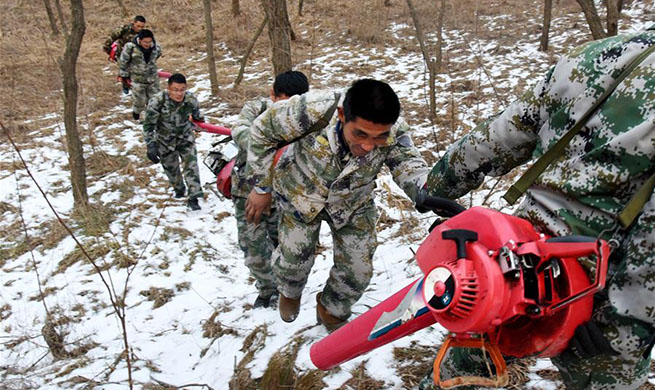BEIJING, Jan. 10 (Xinhua) -- A Chinese hospital on Thursday launched free consultations featuring artificial-intelligence (AI) cameras to detect ocular fundus diseases, which are a major cause of blindness.
Deqing county hospital in Guangdong Province became the first to use the device, co-developed by China's search engine Baidu and Sun Yat-sen University, to serve the general public, Baidu told Xinhua.
The instrument is capable of diagnosing three types of fundus disorders -- diabetic retinopathy, glaucoma and macular degeneration. It scans the eyes and generates a report in 10 seconds, all done without the need for an ophthalmologist to be present.
With an accuracy rate of 94 percent, it has previously been piloted in hospitals in nine Chinese provinces, according to Baidu.
Though it may be interpreted as AI threatening the jobs of doctors, Baidu said the new tool is aimed to alleviate the needs due to the scarcity of ophthalmologists, especially in China's rural regions.
Fundus diseases are a major cause of blindness in the developing world, where a lack of eye doctors and instruments has stymied timely diagnosis and treatment. China, with a population of 1.39 billion, has only thousands of ophthalmologists capable of analyzing fundus photos screening.
Xu Yanwu, a Baidu engineer developing the instrument, said the AI cameras were specifically designed to address the lack of medical instruments and ophthalmologists at grassroots health facilities.
"It is easy to use and can be operated by a non-professional. Its 94-percent sensitivity and specificity at analysing photos can match that of a senior doctor at a tertiary hospital," Xu said.
RISE OF AI
Thanks to a vast pool of data and the push for innovation, China's AI industry has seen rapid growth in recent years, drawing in tech heavyweights like Baidu, Huawei and Alibaba.
It is not the first time Baidu has demonstrated its prowess in the AI sector. In December, Shanghai started trial operations of a fleet of sightseeing buses equipped with the company's AI technologies, featuring facial recognition and wireless translators.
The use of AI has also been trendy in the medical sector, and many Chinese hospitals are already engaged in AI research, according to Zhang Meifen, an ophthalmologist at the Peking Union Medical College Hospital.
Zhang, who is not involved in the Baidu project, said the device is significant for detecting diabetic retinopathy, a disease common among the over 100 million diabetes patients in China.
"AI technologies can play a big role in China, which has a large population and unevenly distributed medical resources," she told Xinhua.
Zhang acknowledged the prospects that smarter computers may cause some job losses in hospitals in the long term, but insisted that experts are unlikely to be affected.
"Diseases and their treatments are always in a process of change and evolution, so human doctors are always needed to work out tailored solutions," she said.

















